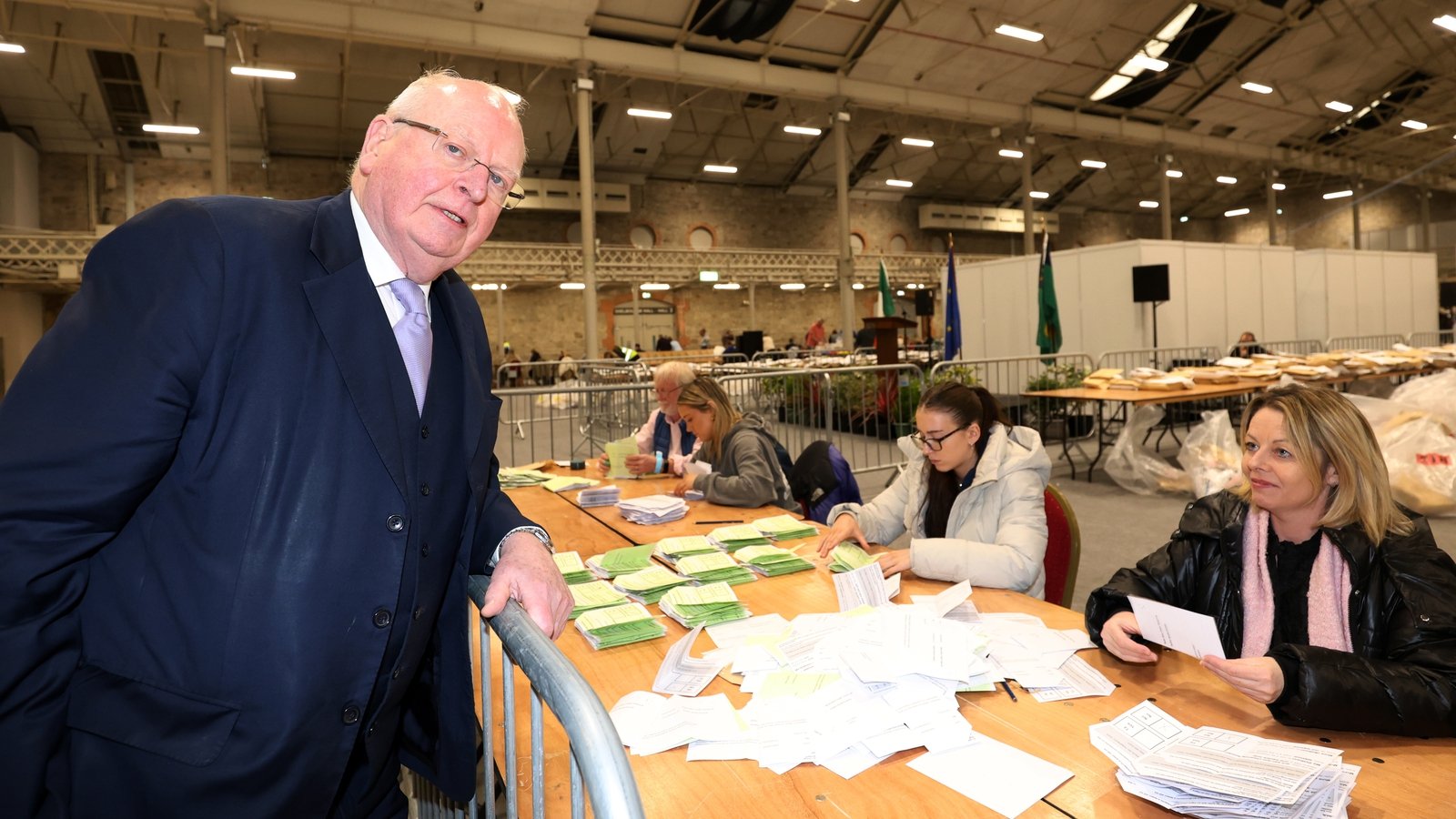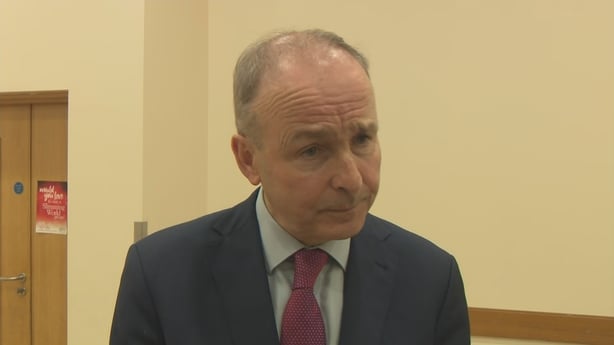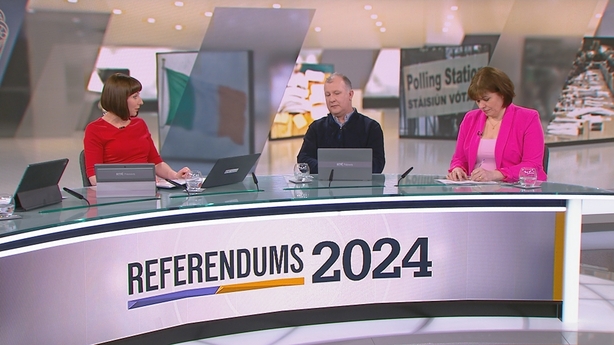Govt ‘misjudged the mood of the electorate’

The Government “misjudged the mood of the electorate” on the two referendums, according to an Independent senator who campaigned against the proposed changes to the constitution.
Speaking to reporters in the RDS count centre in Dublin, Senator Michael McDowell welcomed indications showing that the voters would reject both questions.
“It appears that what’s happening is that the Government misjudged the mood of the electorate and put before them proposals which they didn’t explain and proposals which could have serious consequences,” Senator McDowell said.
Taoiseach Leo Varadkar this afternoon said it was “clear” both referendums have been “defeated comprehensively on a respectable turnout”.
“As head of Government and on behalf of the Government, we accept responsibility for the result,” he said.
“It was our responsibility to convince the majority of people to vote ‘Yes’ and we clearly failed to do so.
“I think we struggled to convince people of the necessity or a need for the referendum at all, let alone the detail and the wording. That’s obviously something we’re going to have to reflect on into the weeks and months ahead.
Mr Varadkar added: “Clearly we got it wrong. I think Enda Kenny famously said once that the electorate often gives the Government a wallop, this was two wallops.
“It’s not the first time though a Government has lost referendum, its actually the 12th and 13th time, so we’ve seen periods in the past where referendums have been defeated and unfortunately this is one of those occasions, but we absolutely accept the result and respect it.
“When you lose a referendum this badly, by this margin, there are many reasons as to why its defeated and while the old adage is that success has many fathers and failure is an orphan, I think when you lose by this kind of a margin, there are a lot of people who got this wrong and I am certainly one of them.”

Tánaiste Micheál Martin said there “is no single reason why these proposals were rejected”.
“While the constitutional change was rejected, it is clear that the need for continued action to support families and to respect principles of equality was not challenged,” he said.
“Action on this will remain an important part of our work as we complete our mandate.”
Mr Martin said he does not envision that the amendments will be put to a vote again.
“On this occasion, the majority clearly were not persuaded as to the merits of the two proposals put forward,” he said.
“Government fully accepts the decision of the people.”
The Tánaiste pointed out that every party in the Oireachtas, bar one, supported the proposed amendments.
“I think, if I could suggest, there probably wasn’t a compelling proposition within the two amendments that was enough to garner support for them,” Mr Martin said.
“They were modest amendments in real terms, but not persuasive enough for people to support.”
Earlier, Green Party Leader Eamon Ryan admitted that it looked like both questions would be defeated.
“The first thing to say is that we respect that,” Mr Ryan said.
“It’s the voice of the people and in our Constitution, it’s the people who are sovereign. It’s they who decide what goes into our Constitution.”
We need your consent to load this comcast-player contentWe use comcast-player to manage extra content that can set cookies on your device and collect data about your activity. Please review their details and accept them to load the content.Manage Preferences
Sinn Féin’s Eoin Ó Broin said it became clear in the last week or so that the carers referendum was going to be defeated significantly.
He said that his party fully accept the result and respected the views of the people and agreed that the confusion of the language around the family did cause problems.
“The primary responsibility for the failure of both referendums lies with Government,” he said.
“Government ignored the considered view of the relevant Oireachtas committee and the Citizens Assembly.”
Speaking to RTÉ’s Saturday with Colm O’Mongáin programme, he added that the Government refused a request for pre-legislative scrutiny where issues of language could have been dealt with, and the Government ran a very poor campaign.
He said that his party supported a Yes, Yes vote as they wanted to remove the limited and outdated language from the constitution, but “we were almost fighting a campaign with one arm behind your back because of the failures of Government”.
Mr O’Broin said he was disappointed that the Yes vote did not pass as it could have been an opportunity to change the Constitution to have more inclusive language around family and insert strong legally enforceable rights for people with disabilities.
Minister of State for European Affairs Peter Burke said it was clear that the public had given a “very strong negative response to both referenda”.
“The reality is the electorate made a clear and informed decision, and we from Government have to listen to that now,” Mr Burke said.
Regarding the confusion around terminology like “durable relationships” he said there will always be risks with terminology under the constitution.
On RTÉ’s Saturday with Colm O’Mongáin programme, he said he respected people’s opinion that there was too much uncertainty around the term.
He said the Government had to take responsibility for the level of uncertainty.
“I’m not here trying to say that the Government did everything right, I think we have to acknowledge that the people have made a decision here,” Mr Burke said.
Labour Party Leader Ivana Bacik, who had campaigned for Yes votes, said the responsibility for the outcome of the poll rests with the Government.
“It is disappointing for those of us who wanted to see a Yes, Yes result and I do think that the responsibility ultimately does lie with Government,” Ms Bacik said.
“We had issues with the Government wording and in particular aspects of the wording on both family and on care that were not in our gender equality committee wording, so I think the Government will need to look now at why they went for working so different and why they didn’t go out more assertively to sell that wording.
“There was a very lacklustre Government campaign and I think that’s unfortunate.”
Minister of State Pippa Hackett acknowledged that early indications from sorting votes “seem to indicate a quite significant No vote on both referendums”.
Speaking to RTÉ News at the count centre in Portlaoise, she said that a No result in both referendums would be “disappointing for the Government”.
When asked if a No, No vote would result in big questions for the Government, she said: “This is what referendums are all about. This is democracy in action and there’ll be certain things I think to reflect on afterwards. But let’s wait till the end of the day.”
Green Party Minister of State Joe O’Brien, who also campaigned for Yes votes, said early tallies were pointing towards a No, No outcome.
‘David vs Goliath’ referendum
Aontú leader Peadar Toibín said it was a very positive result so far. He said that it was not a “No” to single or cohabiting parents, rather a no to Government incompetency in relation to the development of the amendments.
He said that nobody knew what durable relationship was, even Government ministers.
He said it was a David vs Goliath referendum and that in working class Labour and Sinn Féin heartlands, there were significant no votes.
“The leadership of those parties are marooned from their support base,” Mr Toibín said.
“That’s a very dangerous place to be in advance of an election”.
Fine Gael TD Frank Feighan predicted that there would be a “resounding No” to both amendments, probably by a margin of 65 to 35 in the Sligo-Leitrim constituency.
Speaking in the count centre in the Sligo Park Hotel, the Sligo-Leitrim deputy said he had seen rural boxes where up to 80% seemed to have voted No.
“You propose that you want to modernise some aspects of the constitution and the people make their choice and that is what a referendum is all about,” he said.
He said referendums tended to be complex “and I think if people are not sure they will vote No”.
Labour TD Brendan Howlin said the early indications in Wexford likely mirror what is happening around the country.
“A lot of people have just said no, we will stick with the status quo because we are not convinced that the change has been well argued,” he said.
He said people were left to make up their minds, and they either “stayed away in very large numbers or decided our constitution is too precious to take a risk and if I do not understand I’ll vote no.”
Speaking to RTÉ News Mr Howlin said: “If people want to change the constitution, there has to be a very concerted effort to do that, and in truth, I do not believe that the Government parties made any significant effort to explain what they wanted, explain the wording or to counteract misinformation.”
‘A watershed moment for disabled citizens’
Senator Tom Clonan said that the wording in the care referendum was “toxic” to the fundamental human rights of disabled citizens.
He spoke about his 22-year-old disabled son, who he said wants to live independently like his fellow citizens in Ireland.
“The wording at 42.B gave primary expression that family would be the primary expression to the idea that family would be the primary almost exclusive carers with people with additional needs,” Mr Clonan said.
“The State has been abject in its treatment of disabled citizens. We now have an opportunity to debate that going forward, and find ways to really bring ourselves in line with the rest of Europe and how we vindicate the rights of disabled citizens.
“I’m hoping that this is a watershed moment for disabled citizens.”
He said that if the “Yes” had passed, it would have been in contravention of the UN Convention of the Rights of Persons with Disabilities, and would have brought Ireland into disrepute.

‘A bad day for the Taoiseach’
Dr Theresa Reidy, political scientist and UCC lecturer said that during the week it seemed the Family vote was on the Yes side, while there had been more serious questions about the Care referendum.
However, she said that as the campaign progressed, momentum moved to the No side. She added that the number of people undecided had gone up last week, so those who went out to vote and were undecided seemed to have leaned on the No side.
Gary Murphy, Professor of politics at DCU said that 50% would be a reasonable turn out in a referendum.
He said that this was not a great look for our democracy if only one in two people decided to cast their ballot. He said that usually at this stage in the counting it would not be clear which side would win, but this was not the case here.
“It’s a bad day for the Taoiseach, who was the man responsible for putting these referendums to the people, a bad day for Minister O’Gorman as chief spokesperson,” Mr Murphy said.
“It’s a good day for Michael McDowell and Peadar Toibín, but I’m not terribly convinced in the long it’s going to have any great political impact on how people might vote in a general election.”
Dr Laura Cahillane, Associate Professor in the School of Law at the University of Limerick said that a lot of people had concerns about the wording from the start.
“That’s something that the Government should really look at,” Dr Cahillane said.
She said that there appeared to be very little interest in listening to the concerns of people on the wording.
“Maybe there was a certain amount of arrogance in that they believed that people might get carried away on a wave of feminism on International Women’s Day and simply pass these two referendums,” she said.
“You saw very little campaigning on the Yes side, and very little efforts to reassure people about the wording and against all of these concerns arising on the No side.”




